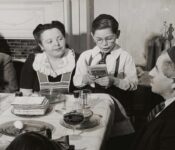Vayishlach: Food for Thought for your Dinner Table
Sunday: The Other Camp will Survive
Fearing an attack from his brother Esau, Jacob divided his family into two camps. He reasoned that should Esau attack one camp, the other would surely be spared. How could Jacob be certain that Esau would not destroy the first camp and then turn around and destroy the second camp?
Rebeca, Jacob’s mother, told Jacob that he and Esau were fated to die on the same day. Assuming that Esau would attack Jacob’s camp first, Jacob reasoned that should Esau succeed in conquering the first camp and murdering Jacob, he too would die during the course of that day. He separated his camps by a distance greater than a single day’s travel, thus ensuring that Esau would die before traversing the distance to the second camp and the second camp would thus be spared. Penninim Yekarim
Monday: The Victim’s Atonement
Jacob send a peace offering to his brother, but instructed that the offering be passed before him. With this, according to the mystics, Jacob sought atonement for himself Why did Jacob seek atonement?
As mentioned above, Jacob knew that he and his brother would die on the same day. Knowing that Esau would fight to the death, Jacob was in a bind. If it came to war Jacob would either kill Esau and win or lose and die. Ironically, his death would quickly trigger his brother’s death. Either way, Esau would die; either by Jacob’s sword or as a result of Jacob’s death. Worried about becoming the cause of his brother’s death, Jacob sought atonement. Tiferet Yonatan.
Tuesday: One Rabbi Is Enough
Esau refused Jacob’s gift saying, “I have much my brother; let what is your be yours.” The Hebrew word for much is “rav,” which also means rabbi. This lends a deeper insight to the text.
We may presume that Jacob, the righteous, attempted to influence his wicked brother. To this his brother replied, “I have my own rabbi, brother,” meaning I have my own way. You keep your way; I will keep mine.
Alternately, Esau might have been saying, “I have a rabbi and he is my brother.” One rabbi is enough for our family. I don’t need to be that rabbi, “let what is yours be yours.” Divrei Yisrael
Wednesday: Rushing on Day One
Esau offered to travel together with Jacob, but Jacob excused himself saying, “The sheep and weak, should they pushed one day they will surely die.” Why should the sheep be pushed?
Esau presumably traveled on Shabbat. Jacob and his camp would rest on Shabbat. If they traveled together Esau would either have to rest on Shabbat, something we mentioned above Esau refused to do, or Jacob’s group would have to travel quickly on Sunday to catch up with Jacob. This, Jacob, said, He would be unable to do for his sheep were soft and weak.
This might account for the words, “should they be pushed one day.” Jacob may have been referring to day one, Sunday, because it would be then that he would need to make up for time lost on Shabbat. Peninim Yekarim
Thursday: The Nature of the Struggle
Jacob struggled with an angel and prevailed. Impressed by Jacob’s prowess the angel granted him a new name, Israel, “For you have struggled against G-d and . .. and prevailed.” What does it means to prevail against G-d ?
Before G-d created the world he concealed himself from it and assigned to us the task of revealing his otherwise concealed presence. This mandate is our daily struggle. We struggle to fulfill G-d’s will, perform his Mitzvot, and to search out the divine service potential in every situation. To Jacob , this mission was a life-long, struggle, but Jacob never despaired. Difficult as it was to wrestle against divine concealment, Jacob kept up the struggle . . .and he prevailed. The lesson: we too can succeed. Likutei Sichot
Friday: Removing the Inner Idol
Having destroyed the city of Shechem, the brothers found a number of idols in the booty they collected. Shortly afterward, just before they embarked for Israel Jacob instructed them to “remove the idols from within them.” He did not say “from among them,” but, “from within them.” What did he mean?
Jacob was referring to the little inner voice that drives us toward indulgence and sin. This yetzer hara, or evil inclination, is akin to an idol for it serves, nay worships, selfish pleasures and needs. Before embarking for Israel Jacob instructed his sons to remove this idol or in other words, to repent. Removing the outer idols from their possession would not suffice; they would also need to remove the inner idol. It is not appropriate to enter the holy land with a proclivity for indulgence and sin. Kli Yakar
Shabbat: Settling In
Esau’s family settled into their country and established a kingdom nearly five hundred years before Jacob did. Why was the wicked son rewarded so much earlier than the righteous son? This is because Jacob would inherit Israel and good things are worth waiting for. It takes a while to become worthy of the holy land.
The Israelites never settled down in Egypt; they always perceived themselves as foreigners in a strange land. Israel is the only place that a Jew can call home. The land and the people are made to fit each other; made to be together. Unlike Esau’s children who settled into their land, outside of Israel, Jacob’s children could never be satisfied outside of Israel. Despite centuries of living in foreign lands, we have never become accustomed to it; we never took to calling it home. Likutei Sichot























